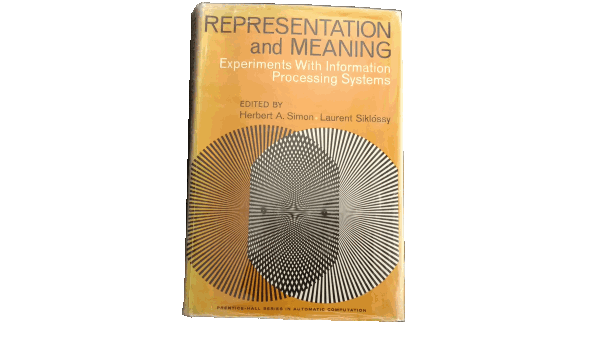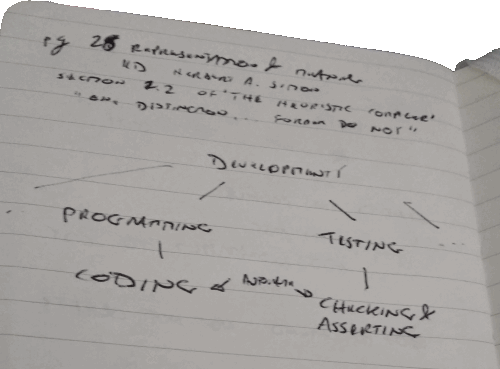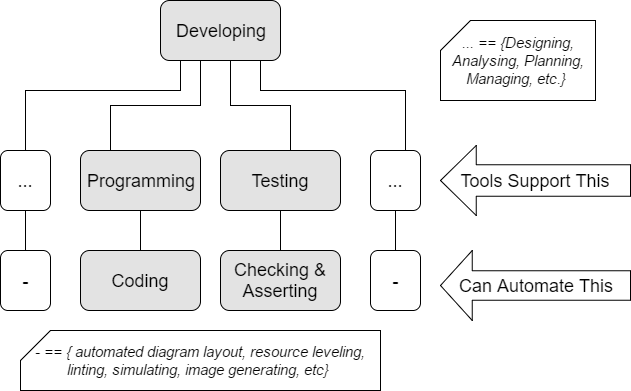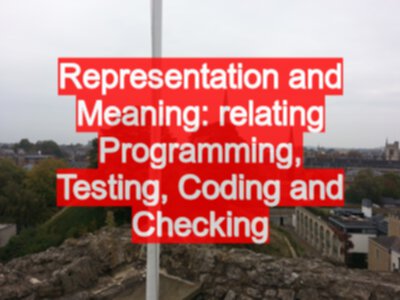TLDR; older computing books and papers have a lot of really useful information - read them. Programming has an ’easy to automate’ level called ‘coding’, with a similar relationship to ’testing’ that ‘checking’ has. Assert as well as Check. Developing includes Testing and Programing and other stuff.

Some quick notes from a reading of the book “Representation and Meaning”, published in 1972, compiles various academic papers from 1960 - 1965.
The first paper in the book “The Heuristic Compiler” by Herbert A. Simon contains the following quote at the start of section 2.2
‘One distinction between the restricted, relatively simple tasks we call “coding”, and the broader, more difficult tasks we call “programming,” is that the latter may encompass the selection or design of an appropriate problem representation, while the former do not.’
Which made me think of the various discussion about “Testing” vs “Checking” and “Automation”, specifically:
- we can’t automate ’testing’, we can automate ‘checking’
- why don’t we talk about “programming automation”?
We can’t automate ’testing’ we can automate ‘checking’
The quoted statement about coding and programming seems to have a similar relationship to statements about checking and testing.
-
Programming and Testing
- broader and more difficult than coding and checking
- selection and design of appropriate problem representations
-
Coding and Checking
- a representation of the work done when ‘programming’ or ’testing’
Why don’t we talk about “programming automation”?
We don’t talk about “programming automation” because we automate coding.
- code completion
- macro systems
- annotations for code generation e.g. projectlombok
- transcompilers
It almost seems abnormal to consider the act of coding without thinking of how we can automate it, we have been doing this to coding since we started coding.
My first major project was the generation of program code from JSP diagrams. In the course of that project I automatically generated ‘C’ and ‘Cobol’ code.
The paper by Herbert A Simon, referenced above describes an exploration of automating the ‘programming’ tasks by treating it as a problem solving exercise. The automating of ‘coding’ was already a given and taken for granted.
A Diagram
I drew a diagram in my notes from reading the book.

I added some extra information to my diagram:
- “…” to represent the fact that ‘developing’ does not consist of only programming and testing
- both programming and testing have levels of representation - the stuff we can easily automate and the stuff that humans do (which we find harder to automate)
- we automate at the ’easy’ level
And for public consumption I have tidied the diagram, and I added additional information:

- “-” to represent the fact that every named ‘high level set tasks’ has a lower level (which may or may not have a name) of easy to automate tasks
- I added ‘asserting’ into the ‘checking’ representation because…
- we check that a particular condition is met e.g.
if(x==2){return false;}- we can report on the check in reports and monitoring
- we assert on it to ‘halt’ execution of an automated process
- we check that a particular condition is met e.g.
Summary
I try to develop a model of ‘automating’ as part of the Software Development. This means I avoid thinking of “test automation” or “automation” and I think that allows me to think broadly about tool support in the development process than limiting it to ’testing’ or ’testers’.
I think this makes it easier to communicate to people who identify with the role of ‘programmer’. Because we no longer talk about ‘automating testing’ we talk about extending the normal process of automating our development approach to include:
- executing code flows in the application
- checking results
- asserting on those checks
And… much value exists in the documentation trail of computing history, seek it out, do not ignore it.
References:
- Representation and Meaning: Experiments with Information Processing Systems, Edited by Herbert A. Simon and Laurent Siklossy, published in 1972
- The Heuristic Compiler, by Herbert A. Simon







